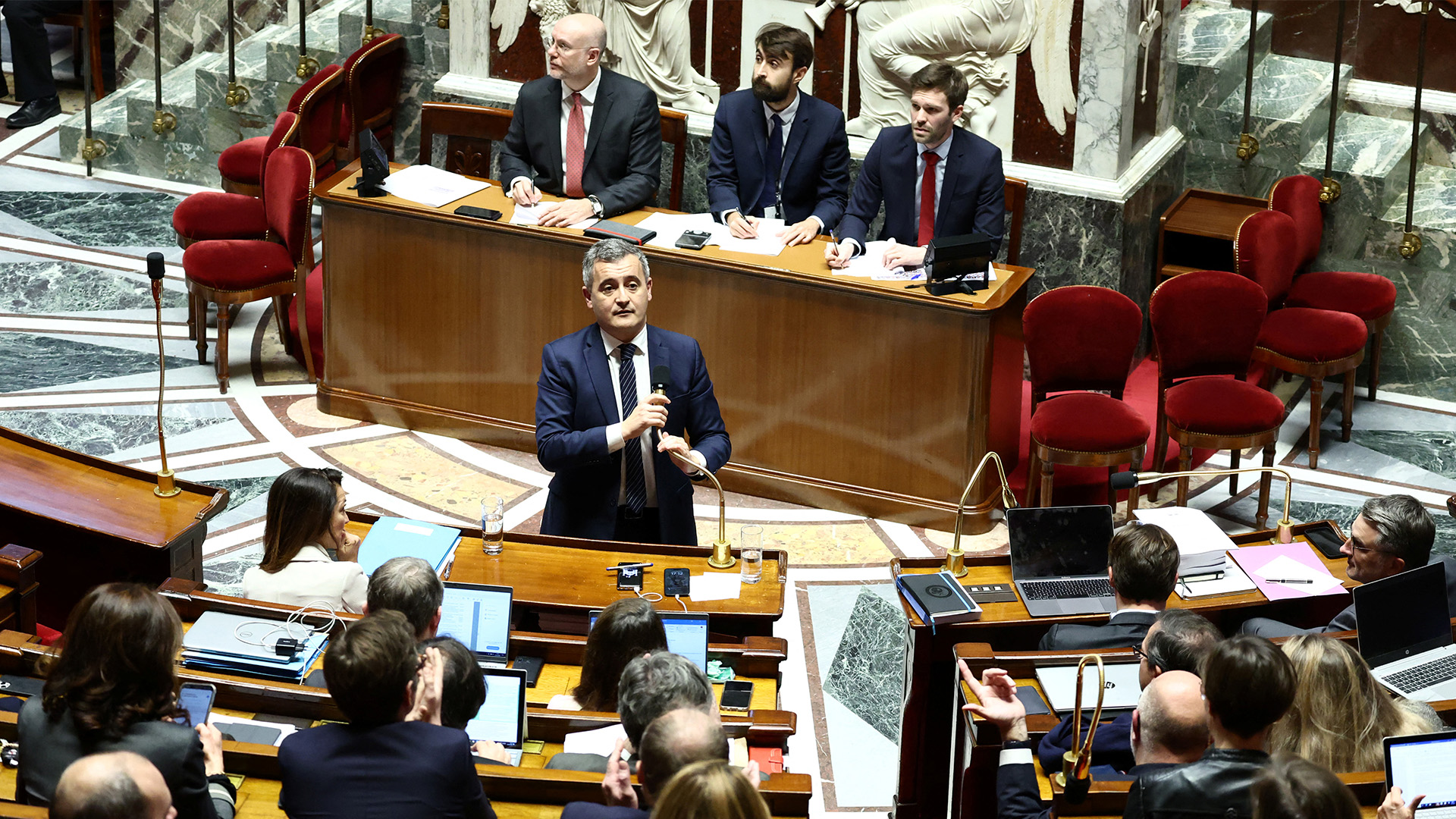France Changes its Immigration Policy
On 26 January, President Emmanuel Macron signed the Law to Control Immigration and Improve Integration. It is considerably less restrictive than the draft adopted by parliament due to the Constitutional Council’s repeal of more than a third of its provisions. The law, which came into force at the beginning of the year, may allow for more effective deportation of immigrants but still will not solve integration and labour market challenges.
 STEPHANIE LECOCQ / Reuters / Forum
STEPHANIE LECOCQ / Reuters / Forum
President Macron announced an overhaul of immigration rules in the 2022 election campaign. It stemmed from the ineffectiveness of the current system and the associated challenges for France’s domestic policy, including the need to ensure better border control and combat irregular immigration, streamline deportation procedures, integrate immigrants more effectively, and respond to the challenges of the French economy. The government hopes to promote economic immigration to boost employment in sectors facing labour shortages. During the procedure of the government’s project in parliament, its provisions were significantly tightened as a result of a political compromise with the Republicans, with strong opposition from left-wing parties and part of Macron’s political camp. However, the Constitutional Council repealed the most controversial provisions, such as tightening the family reunification procedure and restricting immigrants’ access to social benefits.
France’s Immigration Situation
Since 2000, the share of immigrants in the French population has been increasing. In 2022, they represented 10% of the population (around 7 million). According to the Interior Ministry’s annual report on immigration in 2023, France issued around 323,000 first residence permits (up 1.4% year on year), mainly to Moroccan, Algerian, and Tunisian nationals. Among the reasons indicated in the applications, education was the most common (around 104,000), followed by family (91,000) and work (around 55,000).
One of the main challenges remains the large group of irregular immigrants. According to the Ministry of the Interior estimates, this could affect 600,000-900,000 people. The number of annual legalisations of residents of people in this situation is still around 34,000 (+0.3% y/y in 2023). In contrast, last year saw a significant increase in deportations to around 17,000 (+11% y/y), mainly due to the resumption of consular cooperation with Algeria. However, the number of deportations remains lower than before the pandemic (around 24,000 in 2019).
Last year, France recorded a much lower increase in first asylum applications than the European average. Some 145,500 applications were made (+6% y/y and four times as many as in 2010), mainly from Afghanistan, Guinea, Turkey, Côte d’Ivoire, and Bangladesh. In Germany, 350,000 applications were registered during this period (+51% y/y).
The integration of legal immigrants remains problematic. Refugees, in particular those who are less likely to come from French-speaking countries, have problems mastering a minimum level of French. Furthermore, according to the statistics office data on inactivity, the unemployment rate for the entire population in 2022 was 7.3%, but for immigrants it was 11.7%.
New Asylum and Deportation Procedures
One of the government’s main objectives was to strengthen the borders to control migration flows better. The law increases the powers of the police and gendarmerie regarding border control, including giving the services the possibility to carry out ad hoc checks on private vehicles in the border area and extending the control zones (in addition to the internal Schengen borders, also in a strip of 20 km from the coast and in a radius of up to 10 km around ports and airports that are border crossing points). The government has also introduced several new measures concerning asylum policy and deportation procedures. The law introduces the territorialisation of the processing of asylum applications. Gradually, asylum centres (in French, asile) will be created to bring together the activities of the prefects, the French Immigration and Integration Service, and the Office for the Protection of Refugees and Stateless Persons (OFPRA). The staff of the previously centralised OFPRA will be deployed in asylum centres. This is to enable applications to be made as quickly as possible. The reform also included the organisation of the appellate National Asylum Court. It will adjudicate in principle with a single judge, possibly referring complex cases to a larger panel. In addition, territorial chambers of the Court will be created to allow cases to be heard outside its seat in Montreuil near Paris. Provisions have also been introduced making the issuing of visas conditional on the good cooperation of the countries of origin in the readmission of their nationals with irregular status.
The government wants to facilitate the deportation of foreigners who pose a severe threat to public order. The law removes some of the existing safeguards against deportation. In particular, foreigners of irregular status who entered France before the age of 13, those who have lived in France for more than 10 years, and those who have been married to a French citizen for more than three years. Minors will continue to be protected from the obligation to leave French territory. The rejection of an asylum application will also automatically result in an administrative decision on the obligation to leave French territory.
Work and Integration of Immigrants
The new rules aim to enhance the integration of foreigners by promoting French language learning and attachment to the principles of the Republic. The regulations for legalising residence for those already in France have been simplified. An employee working in industries where labour is scarce, such as catering, construction services, and domestic help, and has been employed for at least 12 months in the last two years while residing in France for three years will be eligible for a residence permit without requiring the employer’s prior consent. Prefects will have the discretion to issue permits as before. The law provides that the lists of shortage occupations will be updated at least once a year. The government’s original draft provided for the automatic issuing of a residence permit for work in deficit occupations, but this legislation was rejected during parliamentary work. Instead, sanctions against companies employing undocumented workers were tightened.
Applicants for a residence permit will have to sign a contract in which they commit to respecting the principles of the French Republic (gender equality, freedom of expression, and freedom of conscience), the motto and symbols of the Republic and the territorial integrity of France. A foreigner’s rejection or violation of one of these principles will entitle government officials to refuse to issue a residence permit, revoke it, or not renew it. The reform emphasises the obligation to have a good command of the French language. Integration through language has long been neglected by French legislation. An A2 level will be required for the first issue of a multi-year residence permit. B1 and B2 levels will be necessary for permanent residence and naturalisation permits, respectively. The law furthermore emphasises the contribution to be made by the employer in the language training of employees.
Conclusions
The government has incurred a heavy political cost in proceeding with the immigration law in parliament. The proposed solutions were criticised by left-wing parties and some politicians of the presidential camp, which led to a crisis within the ruling majority. A symbolic victory for the right and the far right dominated the narrative on the direction of changes to immigration law. This will have consequences for internal French politics regarding the difficulty of broadening support for government policies in parliament.
The basis of France’s new immigration law was to strengthen the link between immigration and work, ensuring both better integration and higher incomes for immigrants while weakening their dependence on the welfare system. The new legislation will not help achieve this goal. The original bill contained more favourable provisions for undocumented workers than the bill that eventually came into force. The law may contribute to more effective deportation of immigrants, especially where there is a suspicion of posing a threat to public order; however, it will not significantly improve the integration of immigrants in France, even though this was one of its main objectives. The tools provided by the law are very limited in this regard. Integration of immigrants remains one of the biggest challenges in domestic policy.
The actions taken by France are in line with the efforts towards developing the EU Pact on Migration and Asylum. The pact aims to increase the effectiveness of external border protection and control of irregular immigration, among other things. The experience of France with immigration could be valuable for other European countries, such as Poland, as they develop their migration policies. This applies in particular to the need to include integration policies, mechanisms for monitoring and forecasting migration processes, and the need to increase the participation of foreigners in the labour market.




